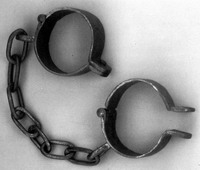Police arrest 2 Mauritanians under suspicion of slavery
Police detained two Mauritanians for allegedly treating two children as slaves - the first suspects to face prosecution on slavery-related charges in this northwest African country.

The mother of the children - a 16-year-old girl and her 14-year-old brother - said Wednesday she had been seeking their release since she herself fled captivity more than 10 years ago.
"I fled my masters because I couldn't bear to be enslaved my whole life, even at the cost of being separated from my two children," Tarba Mint M'Boirik said Wednesday, standing between the boy and girl at an event organized by the SOS Slavery rights group.
On Monday, police arrested Mohamed Ould Nobi, 51, and his 85-year-old mother, Marieme Mint Kneiba, for allegedly forcing the two children to work without pay in Guerrou, a town about 600 kilometers (1,000 kilometers) east of the capital of Nouakchott, local Police Commissioner Henoun Ould Ahmed said.
Authorities said they were the first suspects ever to be arrested on such charges in Mauritania, where slavery is considered by many to be a part of the culture and is embraced in traditional songs and proverbs. In some cases, families of both owners and slaves have lived together and accepted the master-servant relationship for decades.
Though slavery has been banned in Mauritania since 1981, it was not established as a crime punishable by prison time until August. Slaveholders now face up to 10 years in prison and fines.
Still, the two were being held not on charges of slaveholding, but on lesser charges of "infringing on children's rights and depriving them of a right to education, SOS Slavery head Boubacar Ould Messaoud said. He urged the government to charge them under the new anti-slavery law.
"We want the effective application of this new law ... the government needs to take action to eradicate slavery," the rights group leader said.
Others in Mauritania said the move was a necessarily tentative step toward justice.
"If the justices open the door for charges of slavery, there's a risk that it will never end," said Mohammed Ould Hmeyada, a sociology professor and Nouakchott University
Messaoud, himself a former slave, said the two children were made to tend animals and work in fields without pay or the chance to go to school.
It was immediately unclear when Nobi and Kneiba might stand trial, Deputy Attorney General Ahmed Ould Abdallahi said.
Mauritania has become more open about slavery after a 2005 coup overthrew longtime President Maaoya Sid'Ahmed Ould Taya. In May 2006, the head of the junta declared slavery a problem, marking a sharp break from years of denials by Taya that the practice persisted at all.
The newly elected president has eradicating slavery is a priority for his government.
Subscribe to Pravda.Ru Telegram channel, Facebook, RSS!


